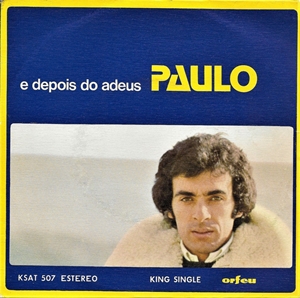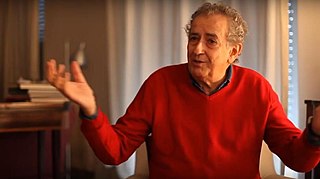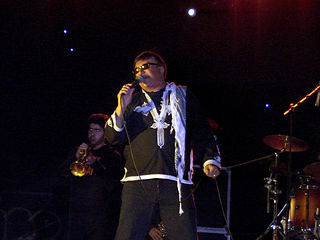Related Research Articles

"Grândola, Vila Morena" is a Portuguese song by singer-songwriter José Afonso, recorded in 1971. It was originally released in Afonso's 1971 album Cantigas do Maio and later released in an EP of the same name in 1973, and as a single in 1977.

"E depois do adeus" is a song recorded by Portuguese singer Paulo de Carvalho, written by José Calvário and José Niza. It is best known as the Portuguese entry at the Eurovision Song Contest 1974, held in Brighton, after winning Festival da Canção 1974.

António-Pedro Saraiva de Barros e VasconcelosGCIH (born 10 March 1939 in Leiria) is a Portuguese film director.

Portugal has participated in the Eurovision Song Contest 54 times since its debut at the 1964 contest. Since then it has missed five contests. The contest is broadcast in Portugal by Rádio e Televisão de Portugal (RTP). Portugal won the contest for the first time in 2017 and hosted the 2018 contest in Lisbon.

António Manuel Mateus Antunes, known professionally as Tony Carreira, is a Portuguese singer and musician. Born in the small rural locality of Armadouro, Pampilhosa da Serra, he moved to Paris at age 10 with his emigrant parents. He lived there for 20 years. Carreira has had several hits since 1991, becoming during the 2000s one of the most renowned and best-selling popular singers in his home country. Tony Carreira has performed sold out concerts in one of the largest venues in Portugal, the Pavilhão Atlântico in Lisbon, and also at the Olympia in Paris. His successful career largely overshadowed and was not affected at all by the fact that the in the late 2010s he was involved in the most controversial plagiarism case in the Portuguese music scene ever.

José Albano Cid de Ferreira Tavares is a Portuguese singer, composer and record producer. Internationally, Cid is best known for his 1978 progressive rock album 10,000 Anos Depois Entre Vénus e Marte and for representing Portugal at the Eurovision Song Contest 1980 with the song "Um grande, grande amor".

Vanessa Sigiane da Mata Ferreira, professionally known as Vanessa da Mata, is a Latin Grammy Award-winning Brazilian MPB singer, songwriter, and novelist. She has released four studio albums and the songs "Ai, Ai, Ai", "Boa Sorte/Good Luck" and "Amado" became number-one hits in Brazil.
Diogo Nuno Infante de Lacerda is a Portuguese theatre, cinema and television actor and television presenter. He is the natural son of Maria Infante de Lacerda by an Englishman named Jonathan and maternal grandson of Renée Lance Infante de Lacerda, daughter of the 5th Barons of Sabroso. He studied at the Lisbon Theatre and Film School.

Paulo de Carvalho is a Portuguese singer.
José Carlos Barbosa Calvário was a Portuguese songwriter and conductor.

Hey Na Na is the ninth studio album by Brazilian rock band Os Paralamas do Sucesso. It was released on June 16, 1998. Main hits of the album include "Ela Disse Adeus", "O Amor Não Sabe Esperar" and "Depois Da Queda O Coice".

Orlando Marques de Almeida Mendes was a Mozambican biologist and writer.
Events in the year 1974 in Portugal.

Mauro Fernandes da Silva, known as Mauro Fernandes, is a Brazilian retired footballer who played as a forward, and is a current manager.
José Feliciano Loureiro Soares is a Portuguese retired professional footballer who played as a central defender.

Michel Laub is a Brazilian writer and journalist.
Rui Pedro da Silva e Sousa, known as Rui Pedro, is a Portuguese professional footballer who plays for Slovenian club Olimpija Ljubljana as a striker.
Portugal was represented by Paulo de Carvalho, with the song "E depois do adeus", at the 1974 Eurovision Song Contest, which took place on 6 April in Brighton. "E depois do adeus" was chosen as the Portuguese entry at the Grande Prémio TV da Canção Portuguesa on 7 March.
Maria João Gonçalves Abreu Soares, known as Maria João Abreu, was a Portuguese film, television and stage actress. Her most notable works include Portuguese TV series Médico de Família, Aqui Não Há Quem Viva, Golpe de Sorte, and her strong presence in the typical Portuguese genre of "teatro de revista". She was famous for her uplifting roles, mostly associated with humour.
References
- ↑ Joana Amaral Cardoso (2013-01-14). "Depois do Adeus, os retornados agora na ficção da TV". publico.pt (in Portuguese). Retrieved 2013-03-30.